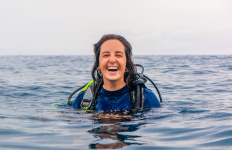

Gretel Waugh
gretel.waugh@uq.net.au
PhD
School of Chemistry and Molecular Biosciences (UQ)

Gretel Waugh
gretel.waugh@uq.net.au
PhD
School of Chemistry and Molecular Biosciences (UQ)
Defining Species & Functional Sensitivity Distributions for Microorganisms
Gretel learnt to swim in a patch of the Coral Sea overlooked by the One Tree Island Research Station, a windswept, corrugated iron shack with brushed sand floors and driftwood hanging heavy with salt spray from the roof. Determined not to succumb to the ires of cliché and become a marine biologist, she trained to become a professional ballerina whilst studying biomedical science and linguistics.
Disenchanted by the academic hamster-wheel of undergrad uni, she ran away to Heron Island where she worked as a naturalist guide. This, followed by a brief stint working on Ningaloo Reef, inspired her to get her act together and study something cool. Something that could take her on adventures. Something she could chase from the furthest reaches of the desert to the vibrant bustle of a coral reef, from the most inhospitable corners of Earth to the unknown landscapes of outer space. Microbes!
Gretel returned to UQ, commenced an undergrad research project aimed at disentangling disease-suppressive interactions of soil microorganisms, and found herself besotted with the intricate lives of our planet’s tiniest inhabitants. Throughout her Honours project exploring the phylogenetic underpinnings of soil microbial pH niche, Gretel realised an unexpected passion for data science and statistics.
Now working at the intersect of molecular biology and ecotoxicology, Gretel leaps out of bed in the mornings excited to run experiments, learn new molecular tools and collect and interrogate data in ways that have tangible applications and practicable outcomes.
When she grows up, Gretel would like to be a migratory shorebird. For now, she is excited to undertake her PhD project jointly between the Australian Centre for Ecogenomics (UQ) and the Australian Institute of Marine Science.
Defining Species & Functional Sensitivity Distributions for Microorganisms
2020 to 2025
Project Description
This project aims to develop a framework to quantify and predict how marine microbial assemblages and their ecologically important functions respond to environmental stress.
Project Importance
Microorganisms critically underpin marine ecosystem services, driving ocean biogeochemical cycling, maintaining ecosystem stability and accounting for ~50% of global primary production. They are also highly responsive to environmental pressures, including local fluctuations (declining water quality, pollution and overfishing) and global stressors (increasing temperature, acidification and deoxygenation). Changes in microbial community composition and function have substantial implications for the health and services of marine ecosystems, as well as considerable diagnostic potential as bioindicators for environmental monitoring. This project will quantify how communities of marine microorganisms respond to environmental perturbations. This will facilitate the development of improved marine risk assessments and guidelines by providing scope for inclusion of microbial data into broader marine species sensitivity distributions.
Project Methods
This project will quantify the effects of diverse stressors on marine microbial community composition, functional potential and metabolic activities through the development of molecular ecotoxicological approaches. Stress-response assays will be performed at relevant field sites as well as in the AIMS SeaSimulator. Samples will be processed for amplicon and metagenomic sequencing at the Australian Centre for Ecogenomics. In tandem with molecular quantification methods including qPCR, metagenomic data will be used to construct species and functional sensitivity distributions that will enable derivation of threshold values for populations of marine bacteria.
Project Results
This project will inform water quality guidelines based upon species and functional sensitivities of prokaryotes at relevant taxonomic levels. Furthermore, it will underpin a framework for the uptake of microbial threshold values into water quality guideline development more broadly.
Keywords
Bacteria,
Climate change,
Coastal development,
Controlled Environment,
Coral reefs,
Corals,
Ecology,
Field based,
Human use,
Manipulative experiments,
Marine planning,
Microbial,
Microbiology,
Modelling,
Molecular techniques,
Ocean acidification,
Ocean warming,
Pelagic,
Pollution,
Quantitative marine science
Supervised By:
Inka Vanwonterghem (The University of Queensland)
Simone Blomberg (The University of Queensland)